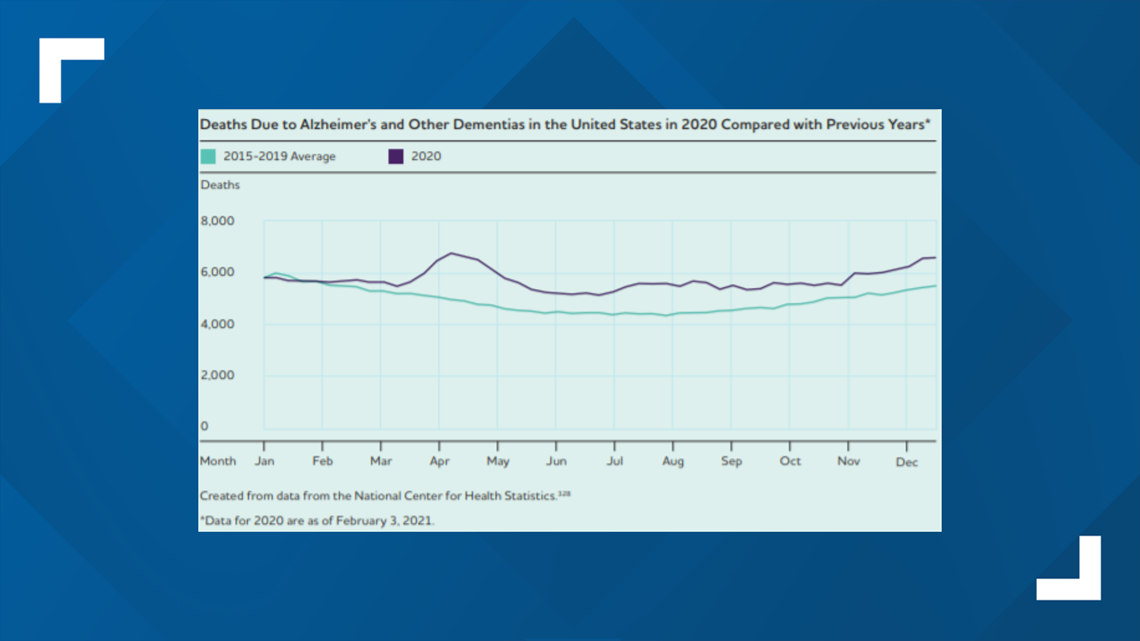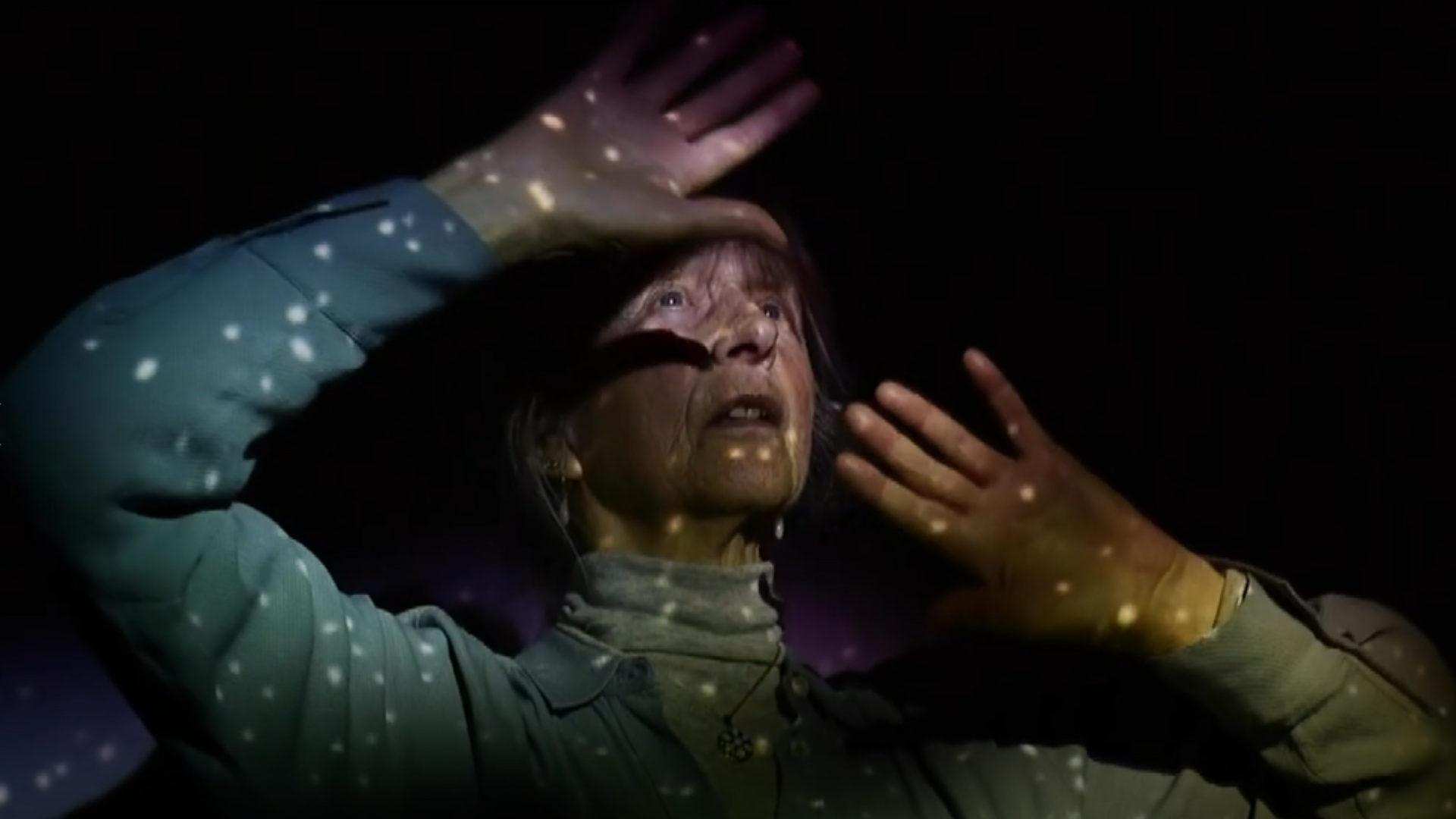TAMPA, Fla. — The coronavirus pandemic has killed more than four million people worldwide, according to data from the World Health Organization. While precautions, such as isolation, were necessary, they took a toll on mental health and didn't help with keeping the minds of people with dementia alive.
According to the Alzheimer's Association, preliminary CDC records show there were 42,000 more deaths from Alzheimer's and other dementias in 2020 compared with the average of the five years before 2020 — about a 16 percent increase.


Kathleen Winters knows the pain those families are going through. She's the executive director of the Alzheimer's Family Organization in the Tampa Bay area.
"I have an aunt that passed from Alzheimer's disease. She was a very outgoing individual, very social, and eventually became withdrawn to herself, very dependent on my uncle and would follow him from room to room," Winters said. "Fortunately, I guess you could say, she passed in her sleep from Alzheimer's."
Unfortunately, this is not a unique experience. The Alzheimer's Society says people with dementia often develop a lack of interest, enthusiasm, or concern, also known as apathy.
"We do know apathy is disastrous for their quality of life and well-being. It's both physically, but also cognitively. So, even their brain deteriorates when you sit still and do absolutely nothing," Founder of Tover, Hester Le Riche said.
Le Riche has a Ph.D. in industrial design engineering from Delft University of Technology. She has dedicated her research to products and tools specifically made to help people with cognitive challenges, as well as their caregivers and family members.
Le Riche wanted to create a product that would improve stimulation, social interaction, and cognition among people with dementia. However, it is not as simple as it sounds.
"It's impossible to design for people with dementia in general. The difference in someone's brain between the first stage and last is huge, it's completely different," Le Riche explained. "I chose to focus on people in the very last stage."
The progression of Alzheimer's is broken down into stages, known as the Global Deterioration Scale. The seven stages are used to rank cognitive function in people with Alzheimer's, with seven being the most severe.
Creators of the scale say around stage five is where people can no longer survive without assistance. This is the group Le Riche is focusing on.
"One of the reasons is that this is also the least active group, so the problem is the biggest. The other reason is products that are designed for the general public are never suited for this group," Le Riche said.
So, she created the Tovertafel, which means Magic Table in Dutch. By using projections onto a table, people with dementia can interact with games and activities that use light and sound as stimulation.
"Their responses are different, and some people like it right away, and some people are reluctant or a little suspicious. It is so captivating to have these bright, moving lights in front of you, that in the end, we will have an interaction or a projection that will evoke somebody's response," Le Riche explained.
While the focus is on people living with dementia, Le Riche has noticed the effects it can have on caregivers or even family members.
"They see things they either haven't seen before, or they used to see in the past. [People say] 'I've seen my mother again because she was always very phonetic at games, and I saw the way she responded to this game. I could see her again and I didn't see dementia, I didn't see the nursing home, I saw my mom,'" Le Riche described.
Winters has also seen similar effects from brain stimulation in her own experiences with dementia.
"I have a cousin in the same family subset who has an individual who has frontal temporal lobe and Parkinson's. We were together this past weekend and my husband was able to stimulate that part of his brain that gave him some very fond memories which got some smiles out of him. His wife said she hasn't experienced that in a long time," Winters explained.
In Le Riche's research, she has found effects from this kind of stimulation to last for a few hours, up to a few days, causing people with dementia to be more alert or social.
While it is not a cure for dementia, it could be a tool for slowing down the progression of the disease.
A study from the University of Edinburgh tested the Tovertafel. Researchers found the majority of patients responded positively and were able to engage with the Tovertafel. One staff member reported they "always have a full table when using the Magic Table and patients are facially bright when using this."
The Alzheimer's Society adds when a person with apathy is withdrawn and loses confidence and abilities, the apathy can actually get worse. Caregivers can support people with dementia by finding tasks and activities the person will enjoy.
"Apathy is fast-tracking the disease, fast-tracking the deterioration," Le Riche explained. "What we've proven in our studies is that we reduce apathy, so in that sense, yes, we know that we are sort of interrupting a bit of the deterioration."
The Alzheimer's Association says Alzheimer's, along with other dementias, will cost the U.S. $355 billion in 2021. By 2050, they estimate costs could rise to $1.1 trillion.
"If you have a couple who is in their 50s or 60s and they've not retired yet and now one of them cannot work and they need round-the-clock supervision, that spouse is going to have to leave their job to stay at home, or pay someone to come into the home," Winters explained. "It is a 24 hour a day job, 7 days a week, 365 days a year. It definitely is going to be a tsunami to the healthcare industry."
For Le Riche and her company, Tover, she hopes products like the Tovertafel can not only act as tools for further research into dementias but also make life more enjoyable and meaningful for people living with dementia.

